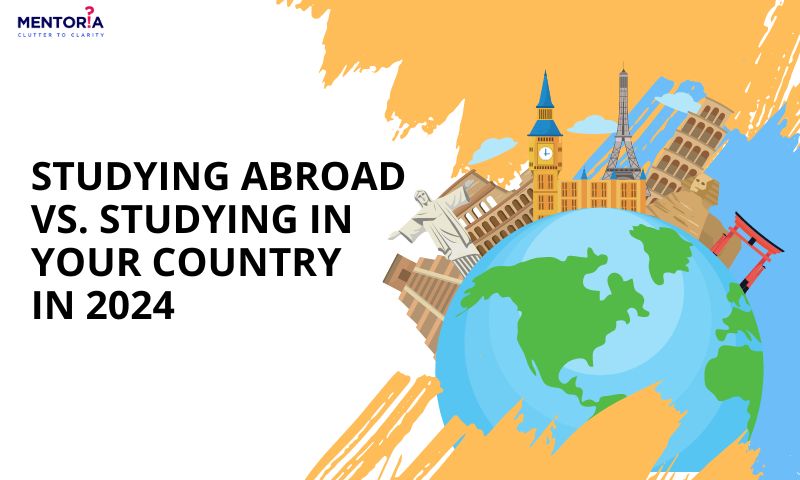Studying Abroad Vs. Studying In India In 2024

Jump to Section
Are you stuck deciding whether to study in India or go abroad?
You’re not alone. Many students and families face this question. On one side, you get the comfort of studying in your home country, close to family and friends. On the other, there’s the exciting opportunity for a foreign degree, global experiences, great research chances, and the career benefits that come with it.
The decision to study abroad versus studying in your own country is a significant one, and in this article, we will look into the pros and cons of each option, providing you with valuable insights to help you make an informed choice in 2024.
Studying Abroad: Embracing Global Opportunities
Studying abroad offers a range of exciting possibilities that can shape your personal and academic growth in ways hard to achieve within the confines of your home country. Let’s explore the advantages in more detail:
Exposure To A New Culture
- Living and studying in a foreign country exposes you to diverse traditions, languages, and customs. This immersive experience broadens your horizons, fostering cultural understanding and adaptability.
- Interacting with students from different backgrounds stimulates intellectual curiosity and challenges your preconceived notions, leading to personal and academic growth.
Enhanced Language Skills
- Studying abroad provides an unparalleled opportunity to immerse yourself in a foreign language, facilitating accelerated language learning and fluency.
- Language proficiency opens doors to international job prospects and enriches your communication skills, making you a more marketable and versatile professional in the global job market.
Expansion Of Networks
- Building connections with peers from around the world cultivates a diverse network of friends and professionals, creating potential future collaborations and opportunities.
- Engaging with international alumni communities offers a support system and a global network that can assist you throughout your academic and professional journey.
Academic Excellence
- Studying at renowned international institutions can provide access to world-class faculty, cutting-edge research facilities, and innovative academic programs.
- Exposure to different educational systems enhances critical thinking, fosters interdisciplinary approaches, and broadens your knowledge base.
Studying abroad grants you the unique opportunity to develop a global perspective and challenges you to embrace new ideas and experiences.
Studying In India: The Comforts Of Home
While studying abroad may have its allure, there are compelling reasons to choose to stay in your home country for higher education. Let’s explore the advantages:
Familiarity And Support System
- Studying in your own country allows you to stay close to family and friends, providing a familiar support system during challenging times.
- Cultural proximity ensures minimal language barriers, making it easier to adapt to academic requirements and the local environment.
Cost Considerations
- Studying in your own country often comes with lower tuition fees and living expenses, alleviating the financial burdens that may arise from studying abroad.
- Access to grants, scholarships, or financial aid specific to your country of study can further reduce the financial strain of pursuing higher education.
Stronger Job Prospects
- Depending on your field of study, certain industries value graduates with local knowledge and expertise, making job prospects more robust when studying in your own country.
- Local internships and work experience opportunities within your home country provide practical exposure and potential job placements.
Retain Local Networking Opportunities
- Studying at a domestic institution allows you to build a network of contacts within the local professional and academic community, fostering future collaborations and career opportunities.
- Alumni connections can be stronger within your home country, leading to a more influential network when seeking job placements or mentorship.
Choosing to study in my home country not only allowed me to save money but also connected me with local resources and networks that furthered my career.
Support And Resources For Studying Abroad
Studying abroad can be a complex process; there are numerous resources and support systems available to assist students in their journey. Many universities and study abroad programs offer comprehensive support services to assist students with the application process, visa requirements, and accommodation options. They may guide you in choosing a suitable one that requires careful planning and preparation. Fortunately, courses, transferring credits, and ensuring a smooth transition to the new academic environment. Additionally, universities often have international student offices or cultural centres that offer support, advice, and resources specifically tailored to the needs of international students.
It’s important to take advantage of these resources and seek guidance throughout the entire process of studying abroad. Whether it’s academic advisors, study abroad coordinators, or fellow students who have already experienced studying abroad, their insights and advice can be invaluable in making informed decisions and navigating potential challenges.
Required Documents
Here are the documents you’ll need for studying abroad:
- Passport and Visa: Make sure you have a valid passport and the necessary student visa for the country you’ll be studying in.
- Admission Letter: You’ll need an acceptance letter from the university or college you’ll be attending. This confirms your enrollment.
- Proof of Funds: It’s important to show that you have enough financial support to cover your expenses while studying abroad.
- Language Proficiency: You may be required to provide proof of your language proficiency. This can be done through tests like IELTS, TOEFL, or similar exams.
- Academic Transcripts: Don’t forget to include copies of your academic records and certificates. These will help showcase your educational background.
Future Trends In Studying Abroad And Studying In Your Country
As the world continues to evolve, so do the trends in studying abroad and studying in your country. With advancements in technology, the traditional notion of studying abroad is being redefined. Online learning platforms and virtual classrooms have become increasingly popular, offering opportunities for international collaboration without the need for physical presence. This trend has been further accelerated by the COVID-19 pandemic, which forced many educational institutions to shift to online learning. As a result, more students are considering virtual study abroad programs or hybrid models that combine online coursework with short-term physical immersion experiences.
Additionally, there is a growing emphasis on global education and intercultural competence within traditional academic programs. Universities are incorporating international perspectives into their curricula, offering study abroad opportunities within the regular course structure, and promoting cultural exchange initiatives. These initiatives aim to provide students with the benefits of studying abroad while minimising some of the challenges associated with it.
It’s important to stay informed about these emerging trends and explore the latest options available for studying abroad and studying in your country. The landscape of higher education is continuously evolving, and being aware of these changes can help you make more informed decisions about your educational journey.
Global Education Trends
Overview Of Current Trends
- Emphasis on hybrid learning Models: Combining in-person and online education for flexibility.
- Technological Integration: Increasing use of advanced technologies for interactive and immersive learning experiences.
- Diversity and Inclusion: Growing commitment to fostering diverse and inclusive educational environments.
- Sustainability Initiatives: Integration of eco-friendly practices in educational programs.
Emerging Opportunities For Students
- Online Learning Evolution: Expansion of online courses and degree programs.
- Global Internship Innovation: Rise in virtual internships, providing international exposure remotely.
- Focus on Mental Health: Recognition and enhancement of mental health support services for students.
- Cross-Cultural Collaboration: Increased global partnerships for collaborative learning experiences.
Employment Landscape
Data On Job Markets
- International Qualifications: Growing recognition and demand for graduates with international educational qualifications.
- Hybrid Skill Requirements: Job markets favouring candidates with a blend of technical and soft skills.
- Technology-Centric Roles: Increasing opportunities in tech-related fields across global job markets.
- Remote Work Dynamics: Ongoing significance of remote work capabilities in various industries.
Anticipated Career Prospects For Graduates In 2024
- Global Job Mobility: Opportunities for graduates to work in diverse locations, facilitated by remote work trends.
- Sustainable Career Paths: Demand for professionals contributing to sustainable practices in various industries.
- Resilience And Adaptability: Valuing graduates with the ability to adapt to changing work environments.
- Cross-Cultural Competence: High regard for individuals with cross-cultural communication skills.
Making The Decision: Factors To Consider
When deciding between studying abroad and studying in your country in 2024, it’s crucial to consider several factors:
Academic And Career Goals
Evaluate the academic and career opportunities available both domestically and abroad. Consider the reputation of institutions, specialised programs, and research opportunities in your field of study.
Financial Considerations
Assess the cost of studying abroad versus studying in your country, including tuition fees, living expenses, and potential scholarships or grants.
Personal Preferences
Reflect on your personal preferences and comfort level with being away from home, adapting to a new culture, and potentially experiencing language barriers.
Support Systems
Research the support and resources available for studying abroad, including university services, cultural centres, and student organisations that cater to international students.
Long-term Goals
Consider how studying abroad or studying in your country aligns with your long-term career goals and aspirations. Evaluate the potential benefits of international experience and cross-cultural skills in your chosen field.
By carefully considering these factors and weighing the pros and cons, you can make an informed decision that aligns with your academic, personal, and career goals.
What Is The Process For Applying For Scholarships To Study Abroad?
Get Your Documents Together
Once you’ve done your research and picked the country and scholarships you’re interested in, it’s time to gather your documents. It’s best to do this ahead of time, so you’re not scrambling later on. Important documents include your academic transcript, which shows your grades, and your financial records. You’ll need to request these from your current school and any other educational institutions you’ve attended. Your financial records will depend on how you’re currently supported financially. For instance, if your parents support you, you’ll need details about their annual salaries and income. If you’re financially independent, you’ll need to provide your credit score and information about your own income.
Create Your Own Resume
It’s an important document that you’ll need to put together yourself. But don’t underestimate its significance! Your resume should showcase your skills and experience, so you have the freedom to choose what to include. Make sure your CV is appealing and authentic.
Keep it concise, no longer than a page, and focus on the essentials. Don’t stress if you don’t have a long list of extracurricular activities to add. Scholarship committees are more interested in your dedication and passion for a few things. If you excel in multiple areas, that’s fantastic! However, if you’ve devoted your attention to one or two things that truly matter to you, don’t worry about your CV appearing lacking. Instead, highlight the fact that you know your goals and have been actively pursuing them.
Discover Your Contacts
This is a crucial task that requires some prior planning. If you’re uncertain about who could provide a reference for you, consider individuals such as teachers and professors with whom you had a strong bond, previous employers who appreciate your efforts, or even friends who can vouch for you.
Ensure that you inform them about the position you’re applying for and grant them sufficient time to craft a well-thought-out reference. Avoid rushing this process, as it may result in an unimpressive and forgettable reference for the reviewers.
Don’t Forget To Produce A Unique Essay For Each Application You Send In.
Crafting a unique essay for each application is crucial. Your personal essay should never be fake or reused; it should always be fresh and genuine. While you can draw inspiration from your first essay, it’s important to avoid making it identical. To achieve this, break it down into key points. Ultimately, aim for a well-written, inspiring essay that showcases your passions, goals, and dreams, and explains how the scholarship will help you achieve them. Paint a vivid picture, captivate the reader, and always be truthful. Share your personal experiences, discuss the factors that influenced your career choice, and ensure that you adhere to any provided guidelines or prompts.
Top Countries For Higher Education Abroad In 2024
Germany
Best Colleges
- Technical University of Munich, Ludwig
- Maximilian University of Munich,
- Humboldt University of Berlin,
- Heidelberg University,
- University of Freiburg,
- University of Stuttgart,
- Karlsruhe Institute of Technology,
- RWTH Aachen University,
- University of Tübingen,
- University of Göttingen,
- Freie University of Berlin
Average Per Year Expense
€0 (public universities) or up to €26,300 (private universities)
Scholarships offered
Deutschlandstipendium
The Deutschlandstipendium is a scholarship programme in Germany aimed at supporting talented and motivated students. Funded by the federal government, private donors, and companies, it provides financial assistance to students pursuing higher education. Recipients are selected based on academic excellence, social engagement, and personal achievements. The scholarship amount is 300 euros per month, half of which is contributed by private sponsors. It serves as a means to encourage diversity and equal opportunities in education by supporting individuals with exceptional potential.
Erasmus+ Scholarships
The Erasmus+ Scholarship is a prominent programme by the EU that promotes global mobility for students and professionals. To be eligible, you should either have a bachelor’s degree or be in your final year of bachelor studies and graduate before the master’s programme begins. The application process takes into account your academic achievements. The scholarship covers travel, living expenses, and insurance, but it’s important to keep in mind that it’s wise to plan for any additional costs.
DAAD Scholarships
The DAAD Scholarships, provided by the Deutscher Akademischer Austauschdienst, are highly esteemed chances for students, researchers, and professionals from around the world to study and carry out research in Germany. These scholarships cover a diverse array of fields and educational levels, assisting individuals in their pursuit of academic excellence. The DAAD scholarships encompass a wide range of programs, such as study scholarships, research grants, and postgraduate courses. Typically, applicants are evaluated based on their academic accomplishments, research proposals, and language skills. In addition to supporting individual academic endeavours, the DAAD scholarships also promote international collaboration and cultural exchange.
Eligibility
Strong academic record, financial need
Current Stats About Everything
Language barrier can be a challenge, culture is different from home country
Canada
Best Colleges
- University of Toronto,
- McGill University,
- University of British Columbia,
- McMaster University,
- University of Alberta,
- University of Calgary,
- University of Ottawa,
- University of Waterloo,
- University of Western Ontario,
- Queen’s University,
- Dalhousie University
Average Per Year Expense
$11,800 to $15,750
Scholarships Offered
Vanier Canada Graduate Scholarships
Vanier Canada Graduate Scholarships (Vanier CGS) are distinguished awards given to PhD candidates in social sciences, arts, natural sciences, engineering, and health, among other fields. Worth $50,000 a year for three years, the goal of this fellowship is to attract and keep exceptional researchers who have a strong commitment to leadership and who hope to make a positive impact on Canadian society. The evaluation process considers academic excellence, leadership abilities, and research potential. The Vanier CGS, administered by the Canadian government, plays a vital role in promoting research excellence and interdisciplinary collaboration among doctoral scholars. If you’re interested, make sure to carefully review the eligibility criteria and application procedures for this prestigious scholarship opportunity.
Banting Postdoctoral Fellowships
The Banting Postdoctoral Fellowships are highly competitive awards offered by the Canadian government to attract and retain top-tier postdoctoral researchers in various disciplines. Valued at $70,000 per year for two years, these fellowships aim to support individuals who demonstrate exceptional research excellence, creativity, and leadership potential. Open to both Canadian and international researchers, the Banting Postdoctoral Fellowships cover a wide range of research areas, including health, natural sciences, engineering, social sciences, and humanities. The selection process is rigorous, considering the candidate’s academic achievements, research proposal, and potential contributions to their field. Successful applicants gain the opportunity to conduct groundbreaking research at Canadian universities and contribute significantly to the country’s research landscape.
Canada Graduate Scholarships – Master’s Program
The Canada Graduate Scholarships for Master’s Programs (CGS-M) is a significant initiative supporting outstanding graduate students in Canada pursuing master’s degrees. This competitive programme provides substantial financial assistance to successful applicants, fostering research excellence and innovation. Open to Canadian citizens and permanent residents, the CGS-M emphasises academic achievements and research potential in the selection process. This initiative plays a vital role in empowering the next generation of researchers and professionals, encouraging their contributions to advancing knowledge in diverse fields.
Eligibility
Strong academic record, financial need
Best Academic Programme
Business, engineering, law, medicine, arts
United States
Best Colleges
- Harvard University,
- Stanford University,
- Massachusetts Institute of Technology (MIT),
- California Institute of Technology (Caltech),
- University of Chicago,
- University of Pennsylvania,
- Columbia University,
- Princeton University,
- Yale University,
- Duke University,
- Northwestern University
Average Per Year Expense
$26,000 to $50,000
Scholarships Offered
Fulbright Programme
The Fulbright programme is a renowned international educational exchange initiative sponsored by the U.S. Department of State. Established in 1946, the programme aims to promote mutual understanding between people of the United States and those of other countries. Fulbright offers a variety of grants for students, scholars, professionals, and artists to study, teach, or conduct research abroad, and vice versa. These exchanges encourage cultural exchange, academic collaboration, and cross-cultural engagement. Fulbright Scholars are selected based on academic achievement, leadership potential, and the feasibility and impact of their proposed projects. By fostering global partnerships and facilitating educational experiences, the Fulbright programme contributes significantly to international diplomacy and the advancement of knowledge.
United World Colleges Scholarship Programme
The United World Colleges (UWC) Scholarship Programme is a global initiative that offers transformative educational opportunities to students around the world. UWC schools, located in various countries, provide a distinctive educational experience with an emphasis on intercultural understanding, community service, and leadership development. The scholarship programme aims to bring together students from diverse backgrounds to foster peace and sustainable development. UWC scholarships cover tuition, room, and board for the two-year International Baccalaureate (IB) program. Candidates are selected based on their academic achievements, commitment to social service, and potential to contribute to the UWC community. The UWC Scholarship Programme plays a vital role in nurturing future leaders with a strong sense of global responsibility, promoting cross-cultural dialogue and cooperation.
Benjamin A. Gilman International Scholarship Programme
The Benjamin A. Gilman International Scholarship programme is a U.S. Department of State initiative that aims to diversify the kinds of students who study and intern abroad by offering financial assistance. This scholarship supports undergraduate students with limited financial means, encouraging them to engage in international experiences that are crucial for academic and career development. The Gilman Scholarship provides funding for various study abroad programs, including semester, academic year, and summer opportunities. Recipients are selected based on financial need, academic merit, and their commitment to promoting diversity and inclusion. By making study abroad more accessible, the Gilman Scholarship aims to prepare students for an increasingly globalised world and enhance their cross-cultural understanding.
Eligibility
Strong academic record, financial need
Best Academic Programme
Business, engineering, law, medicine, arts
Current Stats About Everything
Cost of living is high, culture is different from home country.
In my opinion, European universities are the best choice for higher education for several reasons.
- The course structure is well-organised and efficient. Unlike in the USA, where credits can be earned through projects and workshops, European universities prioritise theory-based learning for credit. However, this doesn’t mean that practical projects are disregarded. Both theory and projects hold importance, but credits are only awarded for theory, making it slightly more challenging.
- European universities have significantly lower fees compared to the USA and other countries. Additionally, there are more funding opportunities available in Europe. This makes pursuing higher education more affordable and accessible.
- Europe is known for its rich culture, offering a high quality of life. Living and studying in Europe will expose you to diverse experiences and broaden your horizons.
If you’re considering European universities, I recommend exploring options in Germany, Sweden, Switzerland, the Netherlands, or Italy. However, it’s important to note that some countries may require you to learn the local language in order to secure a job. Nevertheless, countries like Germany and Sweden are becoming more open to international students and offer good job opportunities.
Clear Choices: Global Adventures Vs. Local Learning
Deciding between studying abroad and studying in your country is a significant choice that will shape your educational journey and potentially impact your future. Studying abroad offers the chance to immerse oneself in a new culture, learn a new language, and develop a global mindset. On the other hand, studying in your country provides familiarity and the comfort of staying close to family and friends.
In today’s globalised world, technology has made it easier than ever to connect and communicate with people from around the world. Online learning platforms and virtual classrooms have opened up opportunities for international collaboration without the need for physical presence. These advancements are reshaping the landscape of studying abroad and studying in your country.
Ultimately, the decision depends on your circumstances, academic goals, personal preferences, and financial considerations. By weighing the pros and cons, researching available opportunities, and considering your long-term aspirations, you can make a choice that aligns with your unique situation.
Remember, studying abroad or studying in your country, both options offer valuable experiences and opportunities for personal and academic growth. Embrace the journey, make the most of the opportunities available, and enjoy the transformative power of education.
Mentoria is like having a guiding compass by your side. With Mentoria, You’ll get customised preparation strategies that align perfectly with your unique dreams and academic goals. Our team of career mentors is committed to offering complete support, making sure your child finds the right educational path effortlessly.














